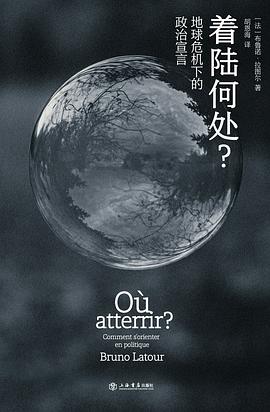
【内容简介】
地球危机下,政治朝向何方,众生回归何处?
近五十年来,全球似乎进入了“大倒退”时代:一面是难民潮、民粹崛起、贫富不平等加剧等政治经济危机,另一面是气候恶化、病毒入侵、生态巨变等人类生存危机。人们试图在越来越不宜居的地球找寻安身立命之所,在早已失去共同愿景的迷惘中探求方向所在。在本书中,当代西方思想巨匠、科学社会学领军人物、法国著名学者布鲁诺•拉图尔浓缩行动者网络、重置现代性、盖亚学说等毕生理论精华,在今日世界经历的不同事件(气候变迁、去管制化、移民、不平等现象暴增等)之间建立起了关联,厘清了看似混乱、实则极为自洽的全球情境,为新世纪的关键议题做出了有益的思考和展望。在现代性与全球化的幻梦破灭、“人类世”危机愈发凸显之际,他提醒我们发现“在地”与“临界区”的丰富性与重要性,由“生产系统”转向“生成系统”,把自然、环境、生态纳入政治考量,摆脱传统的二元对立政治僵局,重新定位理解当代政治的坐标系统。对于希翼让政治回归现实、脚踏实地,在超越现存边界与身份的新领土着陆的现代人而言,本书提供了显明透彻的行动宣言。
【著作者简介】
布鲁诺·拉图尔(Bruno Latour,1947—2022),当代西方世界最有影响力的思想家之一,法国著名哲学家、人类学家,科学社会学研究的领军人物,国际科学与技术研究(STS)的重量级学者,行动者网络理论创立者,曾获霍尔贝格奖、京都奖等学术荣誉。他是最先把科学引入人文研究领域的学者,其理论对人文社科多个领域产生了重要的影响。代表作有《实验室生活》《我们从未现代过》《自然的政治》《潘多拉的希望》《着陆何处?》等。
【 Content Introduction 】
Under the crisis of the earth, where is politics heading and where are sentient beings returning?
In the past 50 years, the world seems to have entered an era of "great regression" : on the one hand, political and economic crises such as refugee flows, the rise of populism, and widening inequality between the rich and the poor, and on the other hand, human survival crises such as climate deterioration, virus invasion, and ecological change. People are trying to find a place to live on an increasingly inhospitable earth, searching for direction in the confusion that has long since lost their common vision. In this book, Bruno Latour, a giant of contemporary Western thought, a leading figure in the sociology of science, and a renowned French scholar, distilles the essence of a lifetime of theories such as networks of actors, resetting modernity, and Gaia to make connections between the different events that the world is experiencing today (climate change, deregulation, migration, exploding inequality, etc.). It clarifies the seemingly chaotic, but in fact extremely consistent global situation, and makes useful reflections and prospects for key issues in the new century. At a time when the illusions of modernity and globalization have broken down and the crisis of the Anthropocene has become increasingly prominent, he reminds us of the richness and importance of discovering "local" and "critical zones", shifting from "production system" to "generative system", integrating nature, environment and ecology into political considerations, breaking away from the traditional binary political deadlock, and repositioning the coordinate system for understanding contemporary politics. For modern people who want to bring politics back down to earth and land in New Territories that transcend existing borders and identities, this book provides a clear statement of action.
【 About the author 】
Bruno Latour (1947-2022), one of the most influential thinkers in the contemporary Western world, a famous French philosopher and anthropologist, a leading figure in the study of the sociology of science, a heavyweight scholar in the International Study of Science and Technology (STS), and the founder of the theory of actor networks. He has received academic honors such as the Holberg Prize and the Kyoto Prize. He was the first scholar to introduce science into the field of humanities research, and his theories had an important impact on many fields of humanities and social sciences. Examples include Laboratory Life, We Have Never Been Modern, The Politics of Nature, Pandora's Hope, and Where to Land? Let's wait.
 热门标签
热门标签












 书单推荐
书单推荐